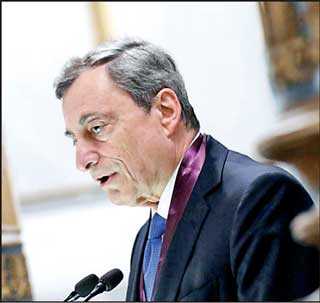Thursday Feb 19, 2026
Thursday Feb 19, 2026
Friday, 25 October 2019 00:00 - - {{hitsCtrl.values.hits}}
London (Reuters): Euro zone business activity stagnated in October as demand withered, according to a downbeat survey published on Thursday hours before European Central Bank President Mario Draghi makes his swansong appearance.
 |
FILE PHOTO: European Central Bank (ECB) President Mario Draghi speaks at the Academy of Athens during his visit in Athens, Greece - REUTERS |
In September, the ECB cut its deposit rate deeper into negative territory and said it would revive its bond-buying program indefinitely to cut borrowing costs and stimulate investment and growth in the euro zone.
But inflation in the euro zone still languishes at less than half the ECB’s target and October’s preliminary Purchasing Managers’ Index (PMI) readings add weight to fears the economic outlook is darkening once again.
IHS Markit’s flash composite PMI, seen as a good guide to economic health, was 50.2, just above September’s more than six-year low final reading of 50.1 but still perilously close to the 50 mark that separates growth from contraction and below expectations in a Reuters poll for 50.3.
“Things are really not getting any better yet. A slight improvement in October PMIs can’t mask the fact that growth has almost stalled. The overall picture is one of a feeble economy,” said Bert Colijn at ING.
Germany’s export-dependent manufacturing sector remained in contraction this month, earlier data showed, suggesting a third-quarter slowdown in Europe’s largest economy could stretch into the closing months of the year.
French activity picked up more than expected, however, boosted mainly by a firmer service sector.
“The divergence between Germany and France persisted,” said Jessica Hinds at Capital Economics.
“All in all, the PMIs will make for uncomfortable reading at the ECB’s policy meeting later today (Thursday) and will lend weight to the doves’ calls for further policy action.”
Draghi chairs his final news conference later on Thursday but it is unlikely to be the grand finale he was hoping for.
The ECB is all but certain to not make any policy changes, six weeks after unveiling a package including new asset purchases worth 20 billion euros a month, a rate cut and a pledge to open the money taps further if needed.
An overwhelming majority — 95% of economists who answered an additional question in last week’s Reuters poll on the central bank — said this latest stimulus package would not significantly help in bringing inflation back to its 2% target ceiling.
Norway’s central bank kept its main interest rate unchanged on Thursday, as predicted, as did Sweden’s. But the Riksbank surprised many by saying it expected to tighten policy in December, even though the economy is slowing more sharply than previously expected.
Europe’s traders prepared for Draghi’s send off by pushing regional stocks to their highest in well over a year on Thursday and nudging the euro towards its best month since January 2018. [MKTS/GLOB]
The Swedish crown surged 0.7% while the Norwegian crown was also dragged higher.
A PMI for the bloc’s dominant service industry nudged up to 51.8 from September’s 51.6, which had been its lowest reading since the start of this year. Economists had expected 51.9.
With the survey painting a gloomy picture, optimism among services firms was at its weakest since mid-2013. The business expectations index sank to 56.5 from 58.6.
Manufacturers also had a bad October and activity contracted for a ninth straight month, the PMI showed. It held steady at September’s 45.7, a low not seen in seven years and missing the median expectation for 46.0.
The manufacturing output index, which feeds into the composite PMI, was 46.2, just pipping last month’s 46.1 but its ninth sub-50 reading in a row.
October’s weak results were despite factory gate prices falling for a fourth month. The output prices index was 48.9 compared to September’s 48.6.